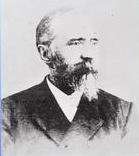John Liggins
| The Reverend John Liggins | |
|---|---|
|
John Liggins | |
| Personal details | |
| Born |
May 11, 1829 Nuneaton, Warwickshire, England |
| Died |
8 January 1912 (aged 82) Cape May, NJ |
Rev. John Liggins, (11 May 1829 – 8 January 1912) was an Episcopalian missionary to China and Japan, the first Protestant missionary and ordained representative of Anglican Communion to reach Japan, and a founding figure in the history of the Nippon Sei Ko Kai.
Background and early life
Liggins was born in 1829 in Nuneaton, Warwickshire, England. In 1841, following the death of his father, Liggins emigrated to the United States of America, initially residing in Philadelphia, Pennsylvania. In 1855, he graduated from the Theological Seminary of the Protestant Episcopal Church at Alexandria, Virginia. In November of the same year he sailed for China arriving in Shanghai on June 28, 1856.
Missionary Work in Japan
Ill health, brought on by malaria, prompted Liggins to visit Japan in 1859, landing in the port of Nagasaki on May the 2nd of that year, two months before the official opening of the foreign settlement. Liggins was the first recorded Protestant missionary to arrive in Japan after the country ended over two centuries of self-imposed isolation.[1][2] Liggins appointed missionary co-worker the Rev.Channing Moore Williams arrived in Nagasaki on June 29. In October 1859 Presbyterian missionaries Dr. and Mrs. James Curtis Hepburn also arrived in Nagasaki from Shanghai, but chose to continue by boat eventually settling in Kanagawa. Liggins and later Williams were initially housed at Kotokuin within Shofukuji Temple as the official foreign settlement was not yet ready for residence.[1]
Liggins immediately found employment teaching English to Japanese interpreters, but the new Nagasaki bugyo proclaimed that, in line with official government policy, he would not allow the teaching of Christianity. The religious duties of Liggins and Williams were thus mainly limited to serving as ministers for the American and British residents of the foreign settlement and to leading services for visiting sailors. Religious texts were not openly distributed, but the sale of academic publications afforded Liggins and Williams some engagement with eager Japanese purchasers on matters relating to Christian teaching. While in Nagasaki, Liggins prepared a book entitled “One Thousand Familiar Phrases in English and Japanese,” which was one of the first books of its kind written in Japan.
Ill health persisted, permitting Liggins to remain in Japan only ten months before leaving Nagasaki for the United States on February 24, 1860. Liggins never again set foot in Japan.
Later Years
Returning to America, Liggins engaged in literary work and became a campaigner for the Temperance movement, subsequently retiring to Cape May, New Jersey where he spent the remaining years of his life. He was a regular contributor to the letters page of the New York Times and his death was duly recorded in that paper in 1912. Among his published works were, “England’s Opium Policy,” “A Missionary Picture Gallery” and “The Great Value and Success of Foreign Missions.”
See also
References
- A Historical Sketch of the Japan Mission of the Protestant Episcopal Church in the U.S.A, New York, Foreign Committee, 23 Bible House, 1883 p. 6. Reference to arrival and early work.
- Japan and the Nippon Sei Kokwai, A Sketch of the Work of the American Episcopal Church, by Edward Abbott, Church Missions Publishing Company, Hartford, CT,1900 University of California, California Digital Library
- New York Times, Letter to the Editor dated April 30, 1900. (PDF)
